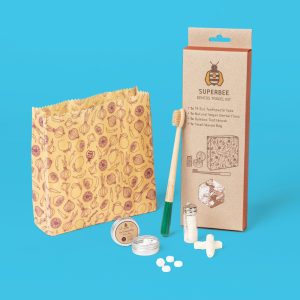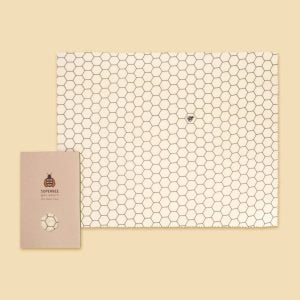How to Keep Kitchen Scrubber from Smelling

Wondering how to keep your kitchen scrubber from smelling bad? You’ve come to the right place!
If you’ve ever picked up your kitchen scrubber and been hit with a not-so-pleasant smell, you’re not alone! It’s a common issue in kitchens everywhere.
The scrubber, while a vital tool in our cleaning arsenal, can often become a breeding ground for odors that are less than desirable. But why does this happen, and more importantly, how can we prevent it?
In this article, we’ll explore the reasons behind smelly kitchen sponges, from the science of bacteria, mold, and mildew to the buildup of oils and food particles. We’ll also provide practical tips to keep your sponges fresh and odor-free.
Let’s tackle this smelly situation head-on! Keep reading to learn more about how to keep your kitchen scrubber from smelling bad.
Why Does My Kitchen Sponge Smell Bad?
Bacteria, Mildew, and Mold
One of the main culprits behind a smelly kitchen sponge is the growth of bacteria, mildew, and mold. These microorganisms thrive in moist, warm environments like a wet sponge.
Each time you use your sponge, it picks up food particles and moisture, creating an ideal breeding ground for these unwanted guests. This microbial activity is often what leads to that all-too-familiar musty, sour smell.
Oils & Food Particles
Apart from microorganisms, the absorption of oils and food particles also contributes significantly to sponge odors. Ultimately, it’s in the nature of a sponge to soak things up, including unwanted odors!
As you wash dishes, bits of food and grease cling to the sponge’s porous surface. Over time, these residues can decompose, releasing unpleasant smells. Without proper cleaning and drying, your sponge can quickly become a hotspot for odor-causing residue.
In the next sections, we’ll explore effective strategies to keep your sponges fresh and odor-free.
How to Keep Sponges from Smelling Bad
Keeping your kitchen sponges from developing unpleasant odors is crucial for a hygienic cleaning routine. Here are some effective strategies:
Regularly Rinsing and Drying Your Sponge
After each use, thoroughly rinse your sponge to remove food particles and soap residue. Squeeze out the excess moisture and store it in a dry, well-ventilated area. This reduces the moisture that bacteria and mold need to grow.
Daily Sponge Sanitization
Disinfect your sponge daily to kill bacteria and mold. You can do this by soaking it in a bleach solution, heating it in the microwave, or running it through the dishwasher.
Replace Your Dish Scrubbers Regularly
No matter how well you maintain them, dish scrubbers don’t last forever. Regularly replacing your sponge, typically every few weeks, ensures you’re always using a clean, odor-free tool.
Alternative Material
Consider using sponges made from materials that are less prone to bacteria growth, such as those with antimicrobial properties or made from natural fibers. Our natural dish scrubber is the perfect tool to keep your kitchen free from odors!
By following these steps, you can significantly reduce the chances of your sponge developing a bad smell, making your kitchen cleaning routine more pleasant and hygienic.
How to Keep Kitchen Scrubber from Smelling Overnight
Proper Drying & Storage
Ensuring your scrubber is completely dry after each use is key to preventing odor buildup. Moist environments encourage bacterial and mold growth, which contribute to bad smells.
After rinsing, thoroughly squeeze out any excess water and leave the scrubber in an open area with good air circulation overnight to dry.
Use a Scrubber Holder
A scrubber holder with good airflow helps in drying the scrubber more efficiently and keeps it away from damp surfaces. This reduces the chance of bacteria and mold growth because the scrubber isn’t sitting in residual moisture.
Occasional Deep Cleaning
Regular deep cleaning is crucial for maintaining the scrubber’s hygiene. Soaking the scrubber in vinegar or a mild bleach solution overnight kills bacteria and mold that may have started to form. This method is effective in neutralizing odors and ensuring the scrubber remains clean and fresh for longer.
Smelly Sponge Microwave Trick
Besides regularly upkeeping your dish scrubber, the microwave trick is a popular method to disinfect and deodorize your sponge. The heat from the microwave kills most of the bacteria and mold, which are the primary causes of the smell.
To safely use this method, ensure the sponge is completely wet before microwaving it. This is because a dry sponge can be a fire hazard.
Microwave the sponge for about one minute on high. This process is effective in reducing sponge odor and extending its usability. However, it’s not a replacement for regular replacement of your sponge.
Using the microwave trick in conjunction with regular cleaning and proper drying techniques can significantly reduce the likelihood of your sponge developing a bad smell.
Why Does Dawn Dish Soap Make My Sponge Stink?
It’s a common misconception that dish soap, like Dawn, can cause your sponge to stink. In reality, the soap itself isn’t the culprit.
The odor issue arises when soap residue is left in the sponge. This residue can trap food particles and create an environment conducive to bacterial growth, leading to unpleasant smells.
To prevent this, it’s crucial to rinse your sponge thoroughly after each use to remove any soap and food remnants. A well-rinsed sponge is less likely to develop odors, regardless of the soap type used.
Understanding the interaction between dish soap and bacteria, and practicing proper sponge rinsing, can help mitigate sponge odor issues associated with using products like Dawn.
Keeping Kitchen Scrubbers Fresh & Ready with SuperBee
From the science behind sponge odors to handy tips like the microwave trick, we’ve seen that maintaining a fresh sponge is all about regular cleaning, proper drying, and timely replacement. Whether it’s through deep cleaning techniques or choosing the right materials, keeping your kitchen sponge odor-free contributes to a more hygienic and pleasant kitchen environment.
Remember, a little care goes a long way in keeping those kitchen sponges fresh and ready to scrub those dishes. But when the time comes, make sure to have a new dish scrubber on-hand to replace the old one – and if you’re using one of our natural loofah dish scrubbers, give it back to the planet and make sure to compost it!




